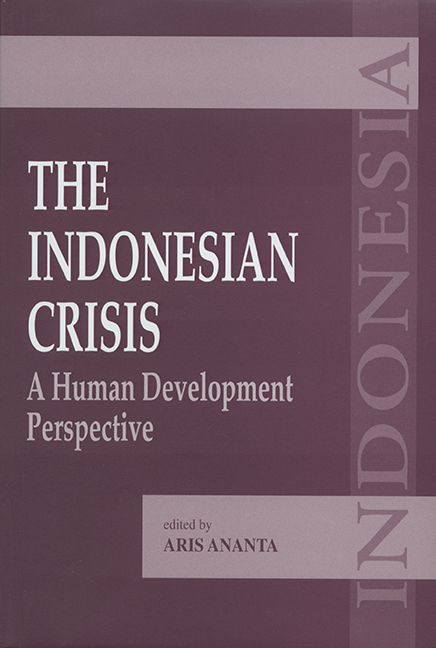Book contents
- Frontmatter
- Contents
- Acknowledgements
- List of Contributors
- Part I Introduction
- Part II Human Capital
- Part III Purchasing Power
- 9 Change in Consumer Price: Indonesian Cities, 1997–99
- 10 Social Safety Net Programmes in Indonesia: Some Efforts to Survive
- 11 State-Created Socio-Cultural Poverty: Lessons from Some Micro Studies
- 12 The Labour Market in Indonesia during the Crisis
- Part IV Emerging Issues
- Index
10 - Social Safety Net Programmes in Indonesia: Some Efforts to Survive
from Part III - Purchasing Power
Published online by Cambridge University Press: 21 October 2015
- Frontmatter
- Contents
- Acknowledgements
- List of Contributors
- Part I Introduction
- Part II Human Capital
- Part III Purchasing Power
- 9 Change in Consumer Price: Indonesian Cities, 1997–99
- 10 Social Safety Net Programmes in Indonesia: Some Efforts to Survive
- 11 State-Created Socio-Cultural Poverty: Lessons from Some Micro Studies
- 12 The Labour Market in Indonesia during the Crisis
- Part IV Emerging Issues
- Index
Summary
Introduction
To overcome the impact of the crisis, the Government of Indonesia (GOI) has implemented a number of policies under the Social Safety Net (SSN) programmes. Managing a large and heterogeneous country in the midst of far-reaching political and economic transition, the GOI has stressed the importance of reaching as much of the affected population as possible.
As mentioned in the presidential speech in front of the DPR (House of Representatives) on 15 August 1998, the Social Safety Net programmes are aimed at integrating special development programmes to overcome the impact of the crisis (crash programmes), including those dealing with disparity, poverty, and backwardness.
The SSN programmes were the result of negotiations in early 1998 between the GOI and the World Bank, representing donor countries. A rescue package for the GOI was recommended as part of the implementation of the Letter of Intent from the International Monetary Fund (IMF). In addition to helping people severely affected by the crisis, these programmes were identified as an effort to secure long-term development processes in which donor countries would be involved for years, mainly through providing loans. The foreign stake in the form of investments and loans was too much to forgo.
With loans from the World Bank, the IMF, the Japan Bank for International Co-operation (JBIC), the Asian Development Bank (ADB), the United Nations, USAID and AusAid, the SSN programmes started in fiscal year 1998/99. These programmes have been implemented up to the third phase, to deal with the worst impact of the economic crisis. This third phase ended in fiscal year 2000. To reduce poverty in the mid to long term, the GOI has revised its policies by, for example, transferring some SSN programmes to the regular programmes in fiscal year 2001.
This chapter discusses the implementation of the programmes and the extent to which they have reached the targetted population in coping with the crisis. The discussions focus on the specific programmes of the SSN which have been implemented in fiscal year 1998/99 and 1999/2000. They are the JPS BK (Jaringan Pengaman Sosial-Bidang Kesehatan — SSN for health), JPS BP (Jaringan Pengaman Sosial-Bidang Pendidikan — SSN for education), OPK (Operasi Pasar Khusus — Special Market Operation for rice), and PDMDKE (Pemberdayaan Daerah dalam Mengatasi Dampak Krisis Ekonomi — Regional empowerment for overcoming the impact of the economic crisis).
- Type
- Chapter
- Information
- The Indonesian CrisisA Human Development Perspective, pp. 266 - 295Publisher: ISEAS–Yusof Ishak InstitutePrint publication year: 2002

